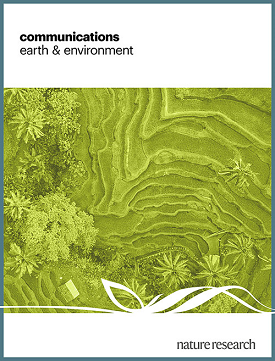Climate change scenarios forecast increased drought exposure for terrestrial vertebrates in the contiguous United States
IF 8.1
1区 地球科学
Q1 ENVIRONMENTAL SCIENCES
引用次数: 0
Abstract
Anthropogenic climate change is altering patterns of extreme weather events across the planet, with far-ranging consequences for biodiversity. Increases in the frequency, duration, and severity of droughts are anticipated to substantially impact natural ecosystems. Here, we predicted the extent to which 1221 terrestrial vertebrates in the contiguous United States will be increasingly exposed to annual (12-month) and prolonged (36-month) drought, under three global climate models and two representative concentration pathways. On average, a 377% increase in annual drought exposure and a 579% increase in prolonged drought exposure are anticipated for the study area by 2050–2080, compared to 1950–2005. Species in the southwestern USA could see the largest increases in drought exposure, while this area also has the highest vertebrate diversity and an abundance of drought-threatened species. Our results aid in identifying vertebrates and ecoregions anticipated to see large increases in drought exposure, which can inform conservation strategies aimed at mitigating vertebrate extinction risks. Anthropogenic climate change is expected to significantly increase drought exposure for 1221 terrestrial vertebrates in the United States, with an average increase of 377% for annual drought and 579% for prolonged drought by 2050–2080, according to analysis of different climate scenarios to assess drought exposure across species and ecoregions.

气候变化情景预测会增加美国毗连地区陆生脊椎动物的干旱风险
人为气候变化正在改变整个地球的极端天气事件模式,对生物多样性产生了深远的影响。干旱频率、持续时间和严重程度的增加预计将对自然生态系统产生重大影响。在这里,我们预测了在三种全球气候模式和两种代表性浓度途径下,美国毗连地区的 1221 种陆生脊椎动物将在多大程度上越来越多地遭受年度(12 个月)和长期(36 个月)干旱的影响。平均而言,与 1950-2005 年相比,预计到 2050-2080 年,研究区域的年度干旱风险将增加 377%,长期干旱风险将增加 579%。美国西南部的物种受干旱影响的增加幅度最大,而这一地区的脊椎动物多样性最高,受干旱威胁的物种也最多。我们的研究结果有助于确定预计干旱风险将大幅增加的脊椎动物和生态区域,从而为旨在降低脊椎动物灭绝风险的保护战略提供信息。根据对不同气候情景的分析,到2050-2080年,美国1221种陆生脊椎动物面临的干旱风险预计将大幅增加,年均干旱风险平均增加377%,长期干旱风险平均增加579%。
本文章由计算机程序翻译,如有差异,请以英文原文为准。
求助全文
约1分钟内获得全文
求助全文
来源期刊

Communications Earth & Environment
Earth and Planetary Sciences-General Earth and Planetary Sciences
CiteScore
8.60
自引率
2.50%
发文量
269
审稿时长
26 weeks
期刊介绍:
Communications Earth & Environment is an open access journal from Nature Portfolio publishing high-quality research, reviews and commentary in all areas of the Earth, environmental and planetary sciences. Research papers published by the journal represent significant advances that bring new insight to a specialized area in Earth science, planetary science or environmental science.
Communications Earth & Environment has a 2-year impact factor of 7.9 (2022 Journal Citation Reports®). Articles published in the journal in 2022 were downloaded 1,412,858 times. Median time from submission to the first editorial decision is 8 days.
 求助内容:
求助内容: 应助结果提醒方式:
应助结果提醒方式:


